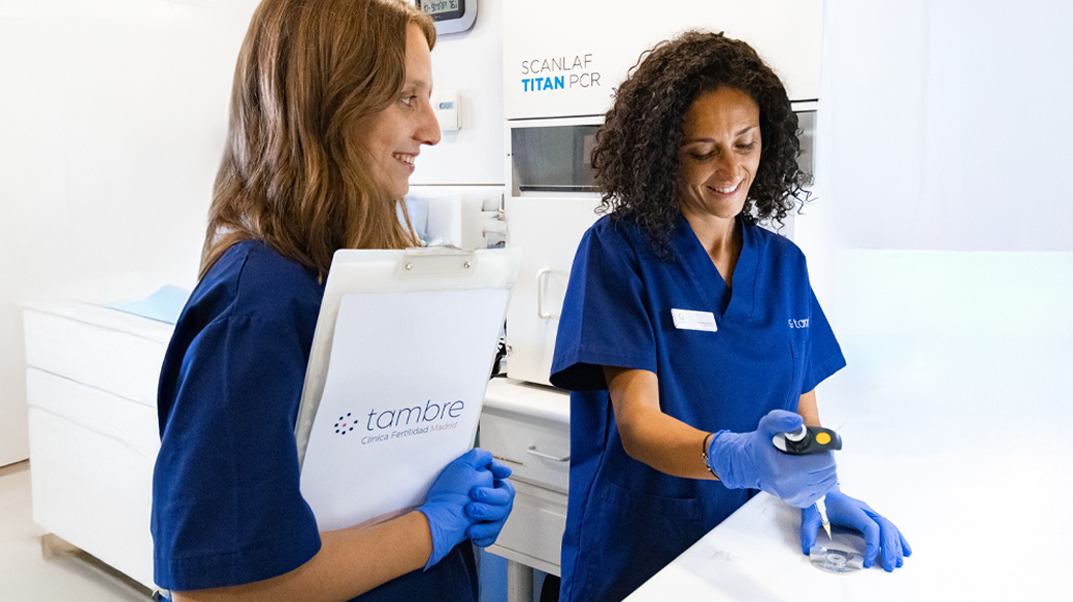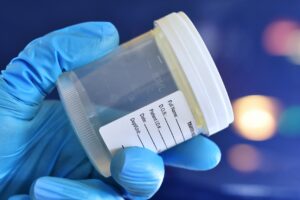blog tambre
What affects semen quality?

Table of contents
When a couple is having trouble conceiving, it is essential to assess both male and female reproductive health. After all, in one third of all couples experiencing fertility problems, the issues originate in the man, and semen quality is a determining factor in achieving pregnancy.
However, it is sometimes possible to improve sperm quality by changing a few simple habits. This is because external factors are partly responsible for the deterioration of semen quality. To improve it, knowing what may be affecting sperm motility, morphology or quantity is essential. Here’s how you can improve your sperm quality to increase your chances of getting pregnant.
Understanding semen quality: What is a semen analysis?
In men, semen quality analysis, known as a semen analysis, is the main test to identify potential fertility problems. This technique evaluates various parameters of spermatozoa. If these values are below the standards set by the World Health Organisation (WHO), pregnancy may be more difficult to achieve, and assisted reproductive techniques may be necessary.
According to the WHO, the three most representative parameters for assessing semen quality by semen analysis are:
- Sperm concentration: Refers to the number of spermatozoa present in one millilitre of semen. A concentration below 15 million/ml may indicate oligozoospermia, a condition that reduces the chances of egg fertilisation. And if the number of spermatozoa is zero, then it is called azoospermia.
- Mobility: Approximately 40% of sperm must move properly so as to pass through the female reproductive tract to the fallopian tubes and reach the egg. When less than 32% of spermatozoa have progressive motility, we speak of asthenozoospermia.
- Morphology: Healthy spermatozoa have oval heads, a robust neck and a mobile tail. If more than 96% of the spermatozoa have an abnormal shape, it is considered teratozoospermia.
In the case where the sample reveals combined alterations in concentration, motility and morphology, this is called oligoasthenoteratozoospermia, which is the poorest quality of sperm and would therefore require assisted reproduction.
Factors that affect semen quality
There are many factors that can have an impact on semen quality. Some are unavoidable, but others are changeable, offering the possibility of improving sperm parameters. These are the most common factors that can affect male fertility:
- Age: Although men can produce sperm throughout their whole lives, sperm quality tends to decline with age. Sperm concentration, motility and morphology may deteriorate, negatively affecting the chances of conceiving. This factor is also related to increased DNA fragmentation.
- Hormonal problems: disturbances in sex hormones, especially abnormal testosterone levels, can affect sperm production.
- High testicular temperature: the testicles must be kept at a lower temperature than the rest of the body for proper sperm production. Factors such as wearing tight clothing, having a fever, prolonged exposure to high temperatures (electronic devices, heat sources, etc.) or the presence of varicocele (varicose veins in the testicles) can increase testicular temperature, reducing semen quality.
- Sexual habits: both a lack of frequent ejaculations and a very active sex life can influence semen quality. Prolonged abstinence can lead to accumulation of harmful substances in the semen, while too frequent ejaculations can temporarily decrease sperm concentration.
- Alcohol and drug use: Excessive use of alcohol and intoxicants can alter hormone levels and consequently reduce semen quality.
- Stress: It has been observed that chronic stress can negatively affect sperm concentration, motility and morphology. In addition, stress can lower libido and create problems such as erectile dysfunction, which can further complicate the road towards pregnancy.
- Exposure to chemicals and toxic substances: being in contact with pesticides, lead, mercury and other chemicals such as bisphenol A, which is found in some plastics, can have a negative impact on sperm production.
- Use of medication: some drugs can affect semen quality. For example, anabolic steroids, used by some athletes to improve physical performance, can significantly reduce sperm quality by altering hormone levels. While many drugs have reversible effects when you stop taking them, bear in mind that others may have irreversible effects.
What can be done to improve sperm quality?
For men with abnormal sperm parameters, there are several recommendations that can help improve semen quality:
- Eat a healthy diet: a diet rich in fruits, vegetables and foods with antioxidant properties can help reduce oxidative stress that damages sperm.
- Maintain regular physical activity: moderate exercise helps to control weight and maintain hormone balance. However, excessive exercise may negatively affect sperm quality.
- Avoiding tobacco, alcohol and drugs: giving these habits up can improve sperm parameters within a few months.
- Managing stress: Relaxation techniques, such as meditation or yoga, can help reduce the negative effects of stress on fertility.
- Use of specific supplements: there are dietary supplements with vitamins and antioxidants designed to improve semen quality. Your doctor can tell you which ones are most suitable for you.
The importance of repeating the semen analysis
Because of the natural variability in semen quality, specialists recommend repeating the semen analysis at least twice, three to six months apart (sperm production, a process known as spermatogenesis, occurs in the testes and can take approximately 64 to 72 days to complete) before a definitive diagnosis can be given. This will make it possible to assess whether lifestyle changes have had a positive effect on sperm parameters and, if necessary, to take additional measures or to resort to assisted reproductive techniques.
Study and treatment of male infertility at Tambre
At Tambre we have our own Andrology Laboratory equipped with the latest technology which allows us to solve most cases of male infertility, without having to resort to donor sperm. We not only assess semen quality, but also other possible causes of male infertility, such as obstructive problems in the seminal tract, infections or genetic causes.
At the first visit to Tambre, we carry out a study of both male and female infertility. In addition to obtaining a detailed medical history with family background and lifestyle habits of the couple, we also carry out analyses and tests such as ultrasounds in the case of women, and semen analysis in the case of men.
When the semen analysis reveals that the sperm count is affected, we can resort to assisted reproduction techniques, such as IVF accompanied by the ICSI technique or intracytoplasmic microinjection, which allows us to select a single good quality spermatozoon that is injected directly into the egg. For this selection, at Tambre we use various techniques such as the ZyMotTM ICSI (formerly FERTILE Chip) or sperm-slow, advanced techniques at Tambre’s Andrology Laboratory to select spermatozoa with better motility and morphology, and less double-stranded DNA fragmentation.
If necessary, at Tambre we can also perform a testicular biopsy by means of the TESA technique (Testicular Sperm Aspiration) which allows us to access the testicle directly to extract the spermatozoa for subsequent use in the ICSI technique.
If you are experiencing difficulties achieving pregnancy, or have a negative diagnosis regarding sperm quality, contact Tambre and book your first appointment by calling +44 (0) 20 38 688 650. We will analyse your specific case comprehensively in order to implement the most appropriate treatment to solve both male and female infertility problems.




